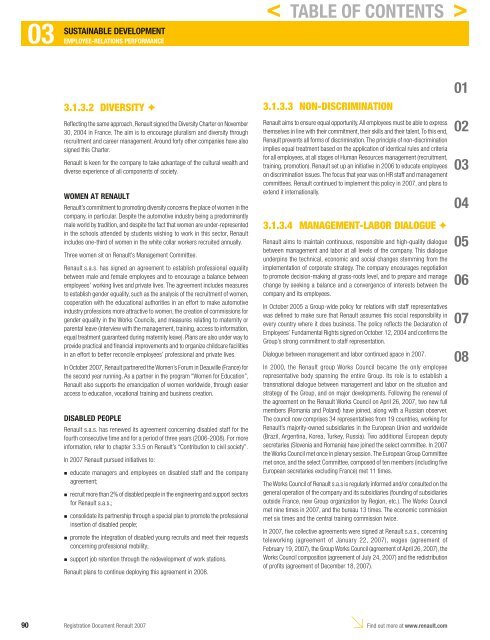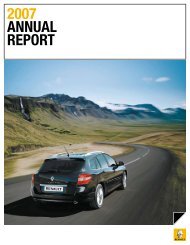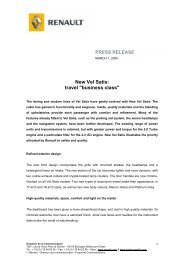2007 Interactive Registration Document - Renault
2007 Interactive Registration Document - Renault
2007 Interactive Registration Document - Renault
You also want an ePaper? Increase the reach of your titles
YUMPU automatically turns print PDFs into web optimized ePapers that Google loves.
03 EMPLOYEE-RELATIONS<br />
SUSTAINABLE DEVELOPMENT<br />
PERFORMANCE<br />
3.1.3.2 DIVERSITY ✦<br />
Refl ecting the same approach, <strong>Renault</strong> signed the Diversity Charter on November<br />
30, 2004 in France. The aim is to encourage pluralism and diversity through<br />
recruitment and career management. Around forty other companies have also<br />
signed this Charter.<br />
<strong>Renault</strong> is keen for the company to take advantage of the cultural wealth and<br />
diverse experience of all components of society.<br />
WOMEN AT RENAULT<br />
<strong>Renault</strong>’s commitment to promoting diversity concerns the place of women in the<br />
company, in particular. Despite the automotive industry being a predominantly<br />
male world by tradition, and despite the fact that women are under-represented<br />
in the schools attended by students wishing to work in this sector, <strong>Renault</strong><br />
includes one-third of women in the white collar workers recruited annually.<br />
Three women sit on <strong>Renault</strong>’s Management Committee.<br />
<strong>Renault</strong> s.a.s. has signed an agreement to establish professional equality<br />
between male and female employees and to encourage a balance between<br />
employees’ working lives and private lives. The agreement includes measures<br />
to establish gender equality, such as the analysis of the recruitment of women,<br />
cooperation with the educational authorities in an effort to make automotive<br />
industry professions more attractive to women, the creation of commissions for<br />
gender equality in the Works Councils, and measures relating to maternity or<br />
parental leave (interview with the management, training, access to information,<br />
equal treatment guaranteed during maternity leave). Plans are also under way to<br />
provide practical and fi nancial improvements and to organize childcare facilities<br />
in an effort to better reconcile employees’ professional and private lives.<br />
In October <strong>2007</strong>, <strong>Renault</strong> partnered the Women’s Forum in Deauville (France) for<br />
the second year running. As a partner in the program “Women for Education”,<br />
<strong>Renault</strong> also supports the emancipation of women worldwide, through easier<br />
access to education, vocational training and business creation.<br />
DISABLED PEOPLE<br />
<strong>Renault</strong> s.a.s. has renewed its agreement concerning disabled staff for the<br />
fourth consecutive time and for a period of three years (2006-2008). For more<br />
information, refer to c hapter 3.3.5 on <strong>Renault</strong>’s “Contribution to civil society”.<br />
In <strong>2007</strong> <strong>Renault</strong> pursued initiatives to:<br />
n<br />
n<br />
n<br />
n<br />
n<br />
educate managers and employees on disabled staff and the company<br />
agreement;<br />
recruit more than 2% of disabled people in the engineering and support sectors<br />
for <strong>Renault</strong> s.a.s.;<br />
consolidate its partnership through a special plan to promote the professional<br />
insertion of disabled people;<br />
promote the integration of disabled young recruits and meet their requests<br />
concerning professional mobility;<br />
support job retention through the redevelopment of work stations.<br />
<strong>Renault</strong> plans to continue deploying this agreement in 2008.<br />
< TABLE OF CONTENTS ><br />
3.1.3.3 NON-DISCRIMINATION<br />
<strong>Renault</strong> aims to ensure equal opportunity. All employees must be able to express<br />
themselves in line with their commitment, their skills and their talent. To this end,<br />
<strong>Renault</strong> prevents all forms of discrimination. The principle of non-discrimination<br />
implies equal treatment based on the application of identical rules and criteria<br />
for all employees, at all stages of Human Resources management (recruitment,<br />
training, promotion). <strong>Renault</strong> set up an initiative in 2006 to educate employees<br />
on discrimination issues. The focus that year was on HR staff and management<br />
committees. <strong>Renault</strong> continued to implement this policy in <strong>2007</strong>, and plans to<br />
extend it internationally.<br />
3.1.3.4 MANAGEMENT-LABOR DIALOGUE ✦<br />
<strong>Renault</strong> aims to maintain continuous, responsible and high-quality dialogue<br />
between management and labor at all levels of the company. This dialogue<br />
underpins the technical, economic and social changes stemming from the<br />
implementation of corporate strategy. The company encourages negotiation<br />
to promote decision-making at grass-roots level, and to prepare and manage<br />
change by seeking a balance and a convergence of interests between the<br />
company and its employees.<br />
In October 2005 a Group-wide policy for relations with staff representatives<br />
was defi ned to make sure that <strong>Renault</strong> assumes this social responsibility in<br />
every country where it does business. The policy refl ects the Declaration of<br />
Employees’ Fundamental Rights signed on October 12, 2004 and confi rms the<br />
Group’s strong commitment to staff representation.<br />
Dialogue between management and labor continued apace in <strong>2007</strong>.<br />
In 2000, the <strong>Renault</strong> group Works Council became the only employee<br />
representative body spanning the entire Group. Its role is to establish a<br />
transnational dialogue between management and labor on the situation and<br />
strategy of the Group, and on major developments. Following the renewal of<br />
the agreement on the <strong>Renault</strong> Works Council on April 26, <strong>2007</strong>, two new full<br />
members (Romania and Poland) have joined, along with a Russian observer.<br />
The council now comprises 34 representatives from 19 countries, working for<br />
<strong>Renault</strong>’s majority-owned subsidiaries in the European Union and worldwide<br />
(Brazil, Argentina, Korea, Turkey, Russia). Two additional European deputy<br />
secretaries (Slovenia and Romania) have joined the select committee. In <strong>2007</strong><br />
the Works Council met once in plenary session. The European Group Committee<br />
met once, and the select Committee, composed of ten members (including fi ve<br />
European secretaries excluding France) met 11 times.<br />
The Works Council of <strong>Renault</strong> s.a.s is regularly informed and/or consulted on the<br />
general operation of the company and its subsidiaries (founding of subsidiaries<br />
outside France, new Group organization by Region, etc.). The Works Council<br />
met nine times in <strong>2007</strong>, and the bureau 13 times. The economic commission<br />
met six times and the central training commission twice.<br />
In <strong>2007</strong>, fi ve collective agreements were signed at <strong>Renault</strong> s.a.s., concerning<br />
teleworking (agreement of January 22, <strong>2007</strong>), wages (agreement of<br />
February 19, <strong>2007</strong>), the Group Works Council (agreement of April 26, <strong>2007</strong>), the<br />
Works Council composition (agreement of July 24, <strong>2007</strong>) and the redistribution<br />
of profi ts (agreement of December 18, <strong>2007</strong>).<br />
90 <strong>Registration</strong> <strong>Document</strong> <strong>Renault</strong> <strong>2007</strong><br />
Find out more at www.renault.com<br />
01<br />
02<br />
03<br />
04<br />
05<br />
06<br />
07<br />
08




